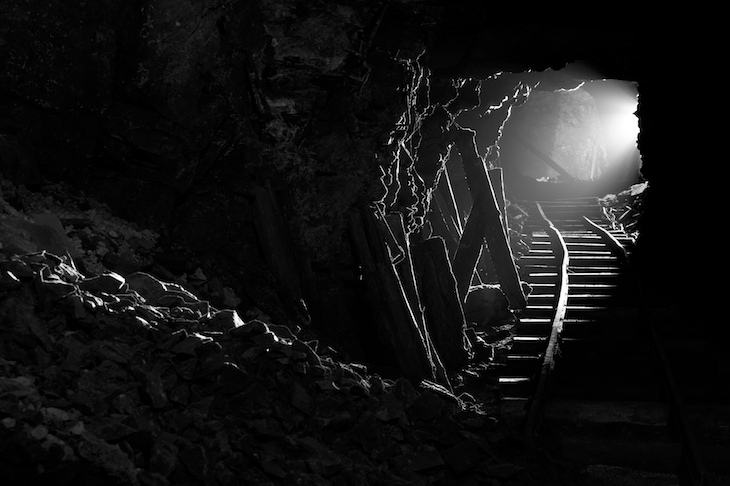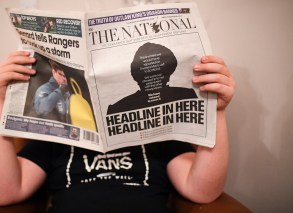Donald E. Westlake wrote crime books that were funny, light and intricate. Help I Am Being Held Prisoner (Hard Case Crime, £7.99) was first published in 1974. The protagonist is Harold Künt. (That umlaut, as you can imagine, is very, very important.) In reaction against his name, he’s become a serial prankster. After one of his jokes goes badly wrong, he ends up in prison. Here he falls in with the Tunnel Gang, a group of inmates who use a secret tunnel to escape into the nearby town. But they only go there for a few hours at a time before returning to prison to serve out their sentences.
Künt strolls around town, chats to locals, even falls in love, and then heads back to his cell. It’s a perfect life. But then the gang decides to rob the nearby bank and Künt is embroiled in the crazy scheme. Westlake piles on the jokes, but there’s a serious heart to the story: a hapless and essentially innocent man, forced to play a double-bluff game, holding both his fellow prisoners and the authorities at bay. The brilliant Hard Case Crime imprint specialises in new books written in the noir tradition, as well as tracking down lost classics. This is a fine example of the latter.
William Boyle’s Gravesend (No Exit, £8.99) is a tale of revenge. Ray Boy Calabrese is released from prison 16 years after his actions led to the death of a young man. Conway d’Innocenzio is the victim’s brother. Driven by desires he can barely contain, Conway stalks Ray Boy and threatens him, but is shocked when Ray Boy asks to be killed: he’s suffering from too much guilt to carry on with life. A pitiful game ensues, against a villain desperate to be murdered, and a potential avenger who can’t quite bring himself to do the act.
Dismal and poetic by turns, the book peels back the skin of Brooklyn, a place offering little hope of escape. Stories intermingle at crooked angles, never quite leading to the expected conclusions. It’s a bold approach, lovingly written. Perhaps the best character is Allessandra, a down-at-heel actress who’s returned to her home town after failing to make it big in Los Angeles. Her broken dreams infect the plot between the two men in a very interesting way. I found the ending too despairing by far, but others might well revel in this depiction of life at its grimmest.
Penguin have been publishing new translations of Georges Simenon’s Maigret novels for a few years now, and the latest, by Howard Curtis, is Maigret’s Travels (Penguin, £7.99). Millionaire David Ward is found dead in his bath in a swanky hotel. Only a few hours earlier, in the same hotel, a countess has attempted suicide. Are the two incidents connected? Maigret follows a dogged path, from Paris to Nice to Geneva, out of touch with the international jetsetters and the film stars he’s forced to mingle with. He has to learn a new set of rules about privilege and the expectations of class, and how these different values can lead to unusual motives for murder.
The Maigret novels are stories of everyday dread. Love is seen as an unequal exchange between business partners, where ex-husbands and wives vie for the spoils left behind by the dead. Simenon writes dispassionately about passion, using Maigret’s eyes as a camera; yet his dour view of life is offset by glimpses of human kindness. These books are ideal for a train journey, as long as you don’t mind seeing your fellow passengers through the author’s lens: everybody’s out for what they can get; everybody’s a slave to hidden desires.
Simone Buchholz’s Blue Night (Orenda, £8.99) introduces Chastity Riley, a former state prosecutor in Hamburg, recently demoted to a witness protection officer. She’s assigned the case of an anonymous man attacked in the street and now under police guard at the hospital. Riley gains the confidence of her charge and finds out that he’s involved in some way with a new drug called krok, a deadly concoction that’s killing young people. Riley travels to Leipzig, following the drug trial.
Blue Night has a unique style: fragmented, flitting from subject to subject. It flirts with the avant-garde. Riley lives life to the full, boozing and balling, but something is missing; this gives the book a yearning quality amid the hangovers and the tangled sheets. I don’t know how long it took to write, but it’s feels as though it was dashed off in a few days. That’s a good thing: witty, overly cynical in places, yet always shot through with a love of the city and its denizens. This is a punk rock album translated into a hard-bitten tale of low life scum and a lone officer. Fierce enough to stab the heart.






Comments